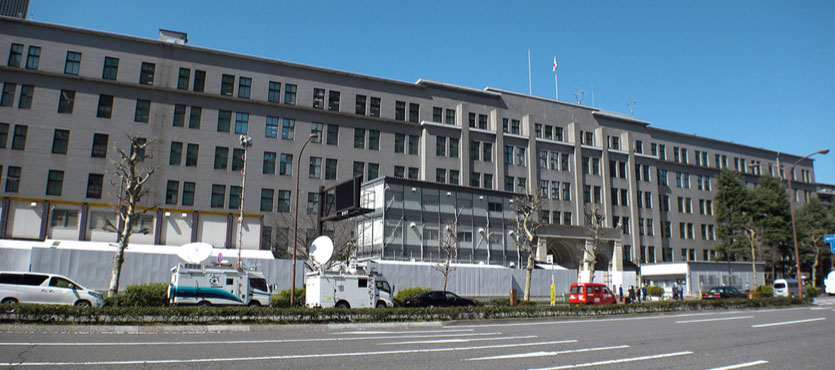A member of the Foreign Ministry told that country’s Homeland Security Committee that the private military contractors accused in a 2016 murder are U.S. government “employees” under the terms of the 1952 Japan-U.S. Status of Forces Agreement (SOFA).
The U.S. government has refused to pay damages to the victim’s survivors, claiming that the perpetrators were private contractors instead of regular servicemembers. But North American Affairs Bureau Chief Kazuhiro Suzuki claimed that SOFA Article 18, Section 6 “is understood to include employees that were indirectly hired.” Defense Minister Itsunori Onodera concurred. “The respective interpretations of SOFA by the Foreign and Defense Ministries are in alignment,” he remarked. Under the terms of the treaty, the U.S. government has immunity only in cases that involve official acts. Otherwise, the government is responsible for damages if the parties cannot come to an agreement.
Further clouding matters, Washington and Tokyo recently signed a pact that concerns the difference between an “employee” and “civilian personnel.” Technically, the former Marine accused of the crime could be classified as either one.
The Legal Status of Private Military Contractors
“Who’s The Boss?” is not just the name of a semi-popular 1980s sitcom. It is also a common question in employment law circles. If ABC Company hires Bill and sends him to XYZ Company to work in the warehouse, does Bill work for ABC, XYZ, or both? If a McDonald’s restaurant hires Jane as a cook, does she work for McDonald’s, the franchisee that owns and operates the restaurant, or both?
The answers to these questions are somewhat unclear for overseas private military contractors, as well. In terms of their responsibilities, the law is more certain. U.S. law is quite clear that private military contractors can only serve in noncombat support roles or in purely defensive operations. Support roles include not only cooks, mechanics, longshoremen, and drivers, but also construction workers, office workers, and other nonmilitary workers.
Furthermore, U.S. overseas contractors only serve in defensive roles. That separates them from Russian and other mercenaries who often operate beyond the law. As an example, the 2007 Nisour Square “massacre” case is still working its way through the courts. If Wagner Group Russian contractors were accused of similar activities, it is doubtful that they would face any justice whatsoever.
Injury compensation, which is an important condition of employment, is also well-defined, as outlined below.
Contractors in Japan
When you declaw a cat, you arguably have a moral obligation to protect it because it cannot defend itself. Similarly, when you demilitarize a country, you arguably have a moral obligation to protect it, since it can no longer defend itself. In the case of the United States and Japan, that moral obligation is a legal obligation that is explicit in the 1952 Treaty of Mutual Cooperation and Security between the United States and Japan. The two nations signed this pact shortly after the Treaty of San Francisco, which formally ended World War II.
The original Japan-America security agreement gave Uncle Sam almost unlimited discretion to not only protect Japan against foreign aggression but also to intervene in domestic disputes. Subsequent amendments in 1960 sharply curtailed this power. Today, the Treaty is the longest sustained peace agreement between two major powers since the 1648 Peace of Westphalia. This series of agreements ended the Thirty Years’ War between the Protestant French and the Catholic Habsburgs, as well as the Eighty Years’ War between Spain and The Netherlands. Balance of power, a key Westphalian principle, remained largely in place until the Cold War.
Back to Japan. Today, there are roughly 50,000 U.S. troops on 23 American bases in the Land of the Rising Sun. Their continued presence was a significant issue until fairly recently. At one point, the U.S. agreed to relocate about half this contingent to Guam. The possibility of both Chinese and North Korean aggression has delayed that move, perhaps indefinitely.
As they do in many other locales, private military contractors perform important support services in Japan. An army cannot function without the aforementioned mechanics, cooks, and other individuals. It is much cheaper for the government to use private contractors in these roles. It is also better for servicemember morale because no one particularly likes KP.
Aside from the occasional high-profile incident, like the one in the above story, contractors usually go about their business without issue. In fact, in most installations, it is almost impossible to distinguish contractors from servicemembers.
Injury Compensation Available
The VA provides ongoing medical care for servicemembers who are injured in Japan, whether due to combat or any other reason. The Defense Base Act provides such hands-on, lifetime care, and as it provides the financial resources that injured overseas contractors need in order to get better. The DBA also pays for lost wages, so contractors have income while they recover.
The medical bills include any and all reasonably necessary medical expenses, potentially for life. That includes:
- Emergency hospitalization.
- Follow up care,
- Physical or occupational rehabilitation,
- Medical devices, and
- Transportation and other ancillary costs.
The DBA insurance company often challenges these payments, arguing that they are not all medically necessary. So, a DBA attorney must aggressively stand up for the victim’s rights and have ample evidence that counters these claims.
Most DBA victims receive two-thirds of their average weekly wage for the duration of their temporary disabilities. If their disabilities are permanent, they receive alternative compensation. That could be a one-time payment or an annuity. It is important to accurately calculate a victim’s average weekly wage. A truck driver in Okinawa makes significantly more money than a truck driver in Oregon.
Contact Barnett, Lerner, Karsen & Frankel, P.A. for more information about DBA procedures.

